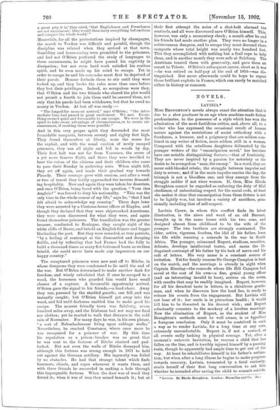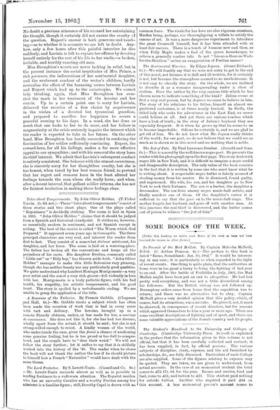NOVELS.
LAVINIA.*
MISS BBOUGHTON'S novels always exact the attention that is due to a slow producer in an age when machine-made fiction predominates, to the possessor of a style which has won the admiration of the most fastidious critics, and, above all, to a writer who has expressed the occasional revolt of human nature against the restrictions of social orthodoxy with a frankness, a humour, and a poignancy that are seldom com- bined in any writer of fiction, more seldom still in a woman. Compared with the rebellious daughters delineated by the younger writers of the " emancipation novel," her heroines have one notable distinguishing feature,—that of femininity. They are never inspired by a passion for notoriety or the desire to be avenged on " man, the enemy." In a word, they are never cold-blooded rebels; the struggle between impulse and duty is severe; and if in the main impulse carries the day, the triumph is not a bloodless one, and they emerge from the struggle sadder if not wiser women. If, then, Miss Rhoda Broughton cannot be regarded as enforcing the duty of filial obedience, of unhesitating respect for the social code, at least she makes it clear that emancipation from these fetters is not to be lightly won, but involves a variety of sacrifices, ecca- sionally including that of self-respect.
Lavinia Carew, in whom this conflict finds its latest illustration, is the niece and ward of an old Baronet, brought up in the same house with his two sons, and designed almost from childhood to be the wife of the younger. The two brothers are strongly contrasted. The elder, active, vigorous, fearless, the idol of his father, loses his life while rescuing a comrade in the war in South Africa. The younger, misnamed Rupert, studious, sensitive, delicate, develops intellectual tastes, and earns the ill- disguised contempt of his father by his lack of nerve and his cult of letters. His very name is a constant source of irritation. Yet for family reasons Sir George Campion is bent on the match, and the marriage is already in sight when Captain Binning—the comrade whose life Bill Campion had saved at the cost of his own—a fine, genial young officer (and an interesting invalid to boot), arrives on the scene, with results that may be readily imagined. Rupert, however, for all his decadent taste in letters, is a chivalrous gentle- man, and when he discovers how the land lies, is ready to release his cousin from the engagement. But Lavinia will not hear of it ; her uncle is in precarious health ; it would kill him to be thwarted in his dearest wish ; and Rupert reluctantly consents to the mockery of a loveless marriage. Now the elimination of Rupert, as the student of Miss Broughton's methods must be well aware, is es hypothest a foregone conclusion. Only it must be contrived in such a way as to render Lavinia, for a long time at any rate, extremely uncomfortable. Rupert is, if not a coward, at all events sadly lacking in physical courage. Yet, after a moment's unheroic hesitation, he rescues a child that has fallen on the line, and is terribly injured himself by a passuig train, though he apparently had ample time to get out of the way. At least he rehabilitates himself in his father's estima- tion; but when after a long illness he begins to make progress towards recovery, Lavinia, tormented by a fatal callosity, avails herself of their first long conversation to askhim whether he intended after saving the child to commit suicide: e Lavinia. By Rhoda Broughton. London : Macmillan and Co. p..1
No doubt a previous utterance of his excused her entertaining the thought, though it certainly did not excuse the cruelty of the question. Rupert's answer is both generous and touch- ing,—as to whether it is accurate we are left in doubt. Any- how, only a few hours after this painful interview he dies suddenly, and Lavinia is left to expiate her offence by devoting herself entirely for the rest of his life to her uncle,—a broken, irritable, and terribly exacting old man.
Miss Broughton's novels are never lacking in relief, but in the present instance the social ineptitudes of Mrs. Prince, a rich parvenue, the indiscretions of her sentimental daughter, and the exuberant candour of the rector's children, hardly neutralise the effect of the harassing scenes between Lavinia and Rupert which lead up to the catastrophe. We cannot help thinking, again, that Miss Broughton has over- shot the mark in her treatment of the heroine and her cousin. Up to a certain point one is sorry for Lavinia, debarred the exercise of a free choice by acquiescence in the wishes of a devoted but tyrannical guardian, and prepared to sacrifice her happiness to secure a peaceful evening to his days. In a word, she has done so much that one looks to her to do more, and her failure in magnanimity at the crisis seriously impairs the interest which the reader is expected. to take in her future. On the other hand, Miss • Broughton has hardly succeeded in rendering the fascination of her soldier sufficiently convincing. Rupert, the coward-hero, for all his failings, makes a far more effective appeal to our sympathies ; and with his removal the story loses its chief interest. We admit that Lavinia's subsequent conduct is entirely consistent. She behaves with the utmost correctness, she is sincerely sorry for her thoughtless cruelty, but she is too honest, when taxed by her best woman friend, to pretend that her regret and remorse have in the least altered her feelings towards the man whom she really loves; and when, after a decent interval, that gallant soldier returns, she has not the faintest hesitation in making those feelings clear.























































 Previous page
Previous page